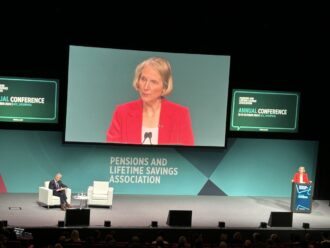COP26 was not much cop, but there were strands that could draw institutional investors to the fore, says Andrew Holt.
Sifting through the wreckage of the COP26 Glasgow Agreement, the Impact Investing Institute has revealed to portfolio institutional some aspects that will be of use to institutional investors – especially in using the momentum to do more.
“COP26’s emphasis on the power of private capital to effect change should be recognised as a call to action for institutional investors,” said Joe Dharampal-Hornby, public affairs and media relations manager, giving a positive spin on the outcome of COP26 for investors.
He cited the announcement of the expansion of the Glasgow Financial Alliance for Net Zero (GFANZ), demonstrating the opportunities for private capital.
GFANZ’s big showpiece at COP26 was uniting over $130trn (£98trn) of private capital to transforming the global economy towards net zero. The commitments come from more than 450 firms across 45 countries aiming to deliver the estimated $100trn (£75trn) needed for net zero over the next three decades.
New analysis commissioned by the UN High Level Climate Action Champions found the private sector could deliver 70% of the investment needed to meet net zero goals.
“But this should also act as a warning to those who have not yet considered their environmental impact that they run the risk of being left behind,” Dharampal-Hornby added.
He then called on institutional investors to do more. “We urge investors and businesses to step up to the challenge of delivering positive environmental and social benefit alongside a financial return, integrating this approach into their investment strategies.”
Dharampal-Hornby therefore noted that he would like to see institutional investors changing their portfolios to become more ESG focused following COP26.
“We hope COP26 will be a catalyst for increased focus on ESG among institutional investors as the necessity of change, and the opportunities it presents, were clearly demonstrated,” he said. “Adopting an environmental focus is not just good for the planet – it is also a sound investment decision.”
Assessing the good and bad of the event, from an investor’s perspective, Dharampal-Hornby noted: “COP26 produced several welcome governmental and private sector announcements, from the expansion of GFANZ to the Chancellor’s pledge to make the UK the first net zero financial centre.”
“But,” he added, “there is much more to do. Without a truly global, just transition that takes people and communities into account, there will not be the public backing needed for the huge changes it requires across the world.”
Predictably, GFANZ co-chair Mark Carney was keen to promote his own group’s initiative. In a statement he said: “The rapid, and large-scale, increase in capital commitment to net zero, through GFANZ, makes the transition to a 1.5°C world possible.
“To seize this opportunity, companies must deliver robust transition plans and governments set predictable and credible policies,” he added. “This will give finance the confidence to invest, pulling forward climate actions and smoothing the transition to net zero.”




